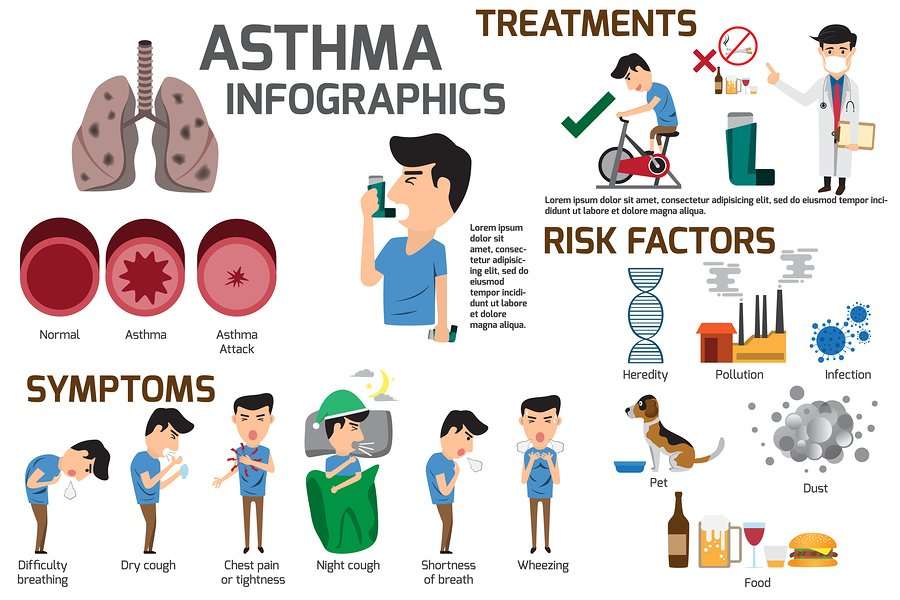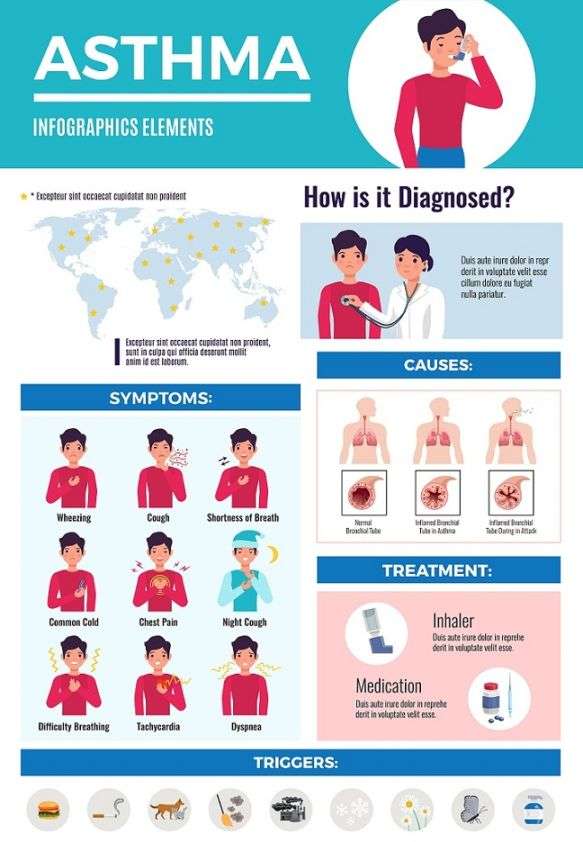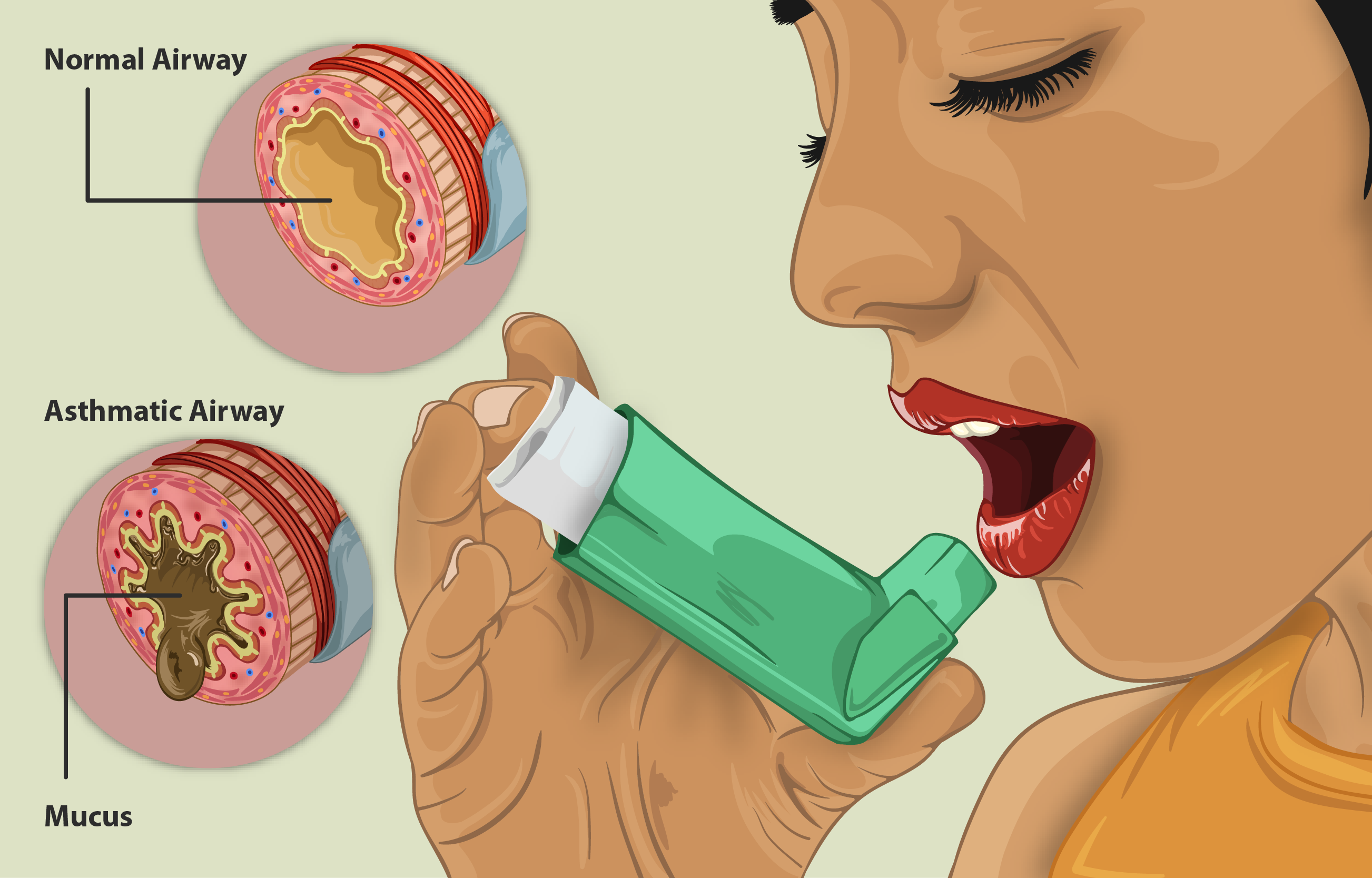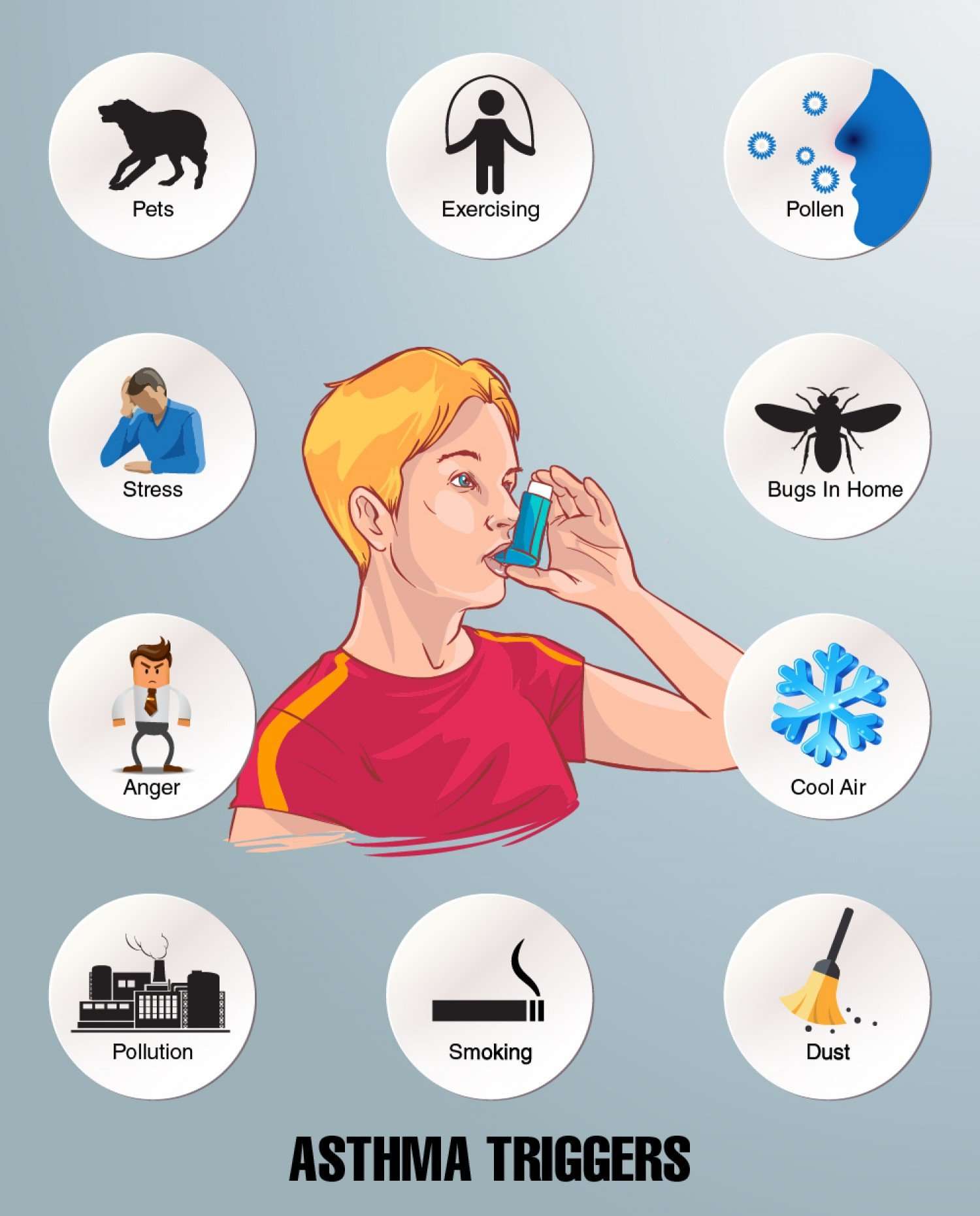What Is Food Allergy
Food allergy is defined as a reaction of an immune system which mainly occurs soon after the body consumes a certain food.
This generally happens when our body identifies certain food to be harmful or allergic thereby causing few reactions and medical symptoms in our body which needs special treatment.
These particular foods which cause an allergic reaction in the body are certainly identified as allergens for these types of individuals.
While for some people, the reaction can be mild or uncomfortable; it can be severe, intolerable and life-threatening for others.
How To Avoid Foods That May Cause Asthma
How Do You Know It’s a Trigger?
If you think that a certain food is triggering your asthma signs and symptoms, you should consult your healthcare provider. There are certain skin tests which will help you relieve an allergy to a specific food type.
Whats the Best Way to Reduce the Risk of the Trigger Affecting You?
If you do know that you are allergic to a certain food and if you have revealed such an allergy with a skin prick test, then you should completely avoid it for the rest of your life. It is also very important to recognize the signs and symptoms of an allergic reaction on time, especially in cases of severe and even life-threatening allergic reactions.
Foods that cause asthma should be avoided if you want to manage its signs and symptoms as good as possible. If your healthcare provider has prescribed you medications for your asthma, dont forget to take them regularly on a daily basis just as prescribed. Remember that by taking your medications regularly, you are less likely to have an asthma attack even if you do not come in contact with a specific food allergen that you know you are allergic to.
Other Tips That Could Help
Here are some tips that can help you avoid foods that cause asthma and asthma attacks:
Know Your Triggers To Help Manage And Control Symptoms
There is no set cure for asthma it can only be and treated. Once you identify your triggers through a skin or blood test, you can come up with the best plan for managing and controlling your symptoms.
Knowing your triggers and avoiding them can help prevent or control an allergy-induced asthma episode. The AFAA advises people not to leave food or crumbs in living quarters to prevent pests like cockroaches; fix leaks to prevent mold; wash bedding in hot water and use mattress and pillow covers to protect against dust mites; vacuum pet dander; and wear a mask when outdoors.
For some with allergic asthma, allergy medications may help avert or alleviate symptoms. If your allergies are extremely severe, you should consider seeing a doctor to discuss a treatment plan that may involve a prescription like . Some over-the-counter options may help those with mild allergy symptoms. These include:
- Steroids
- Decongestants
- Saline nasal sprays
To treat an asthma attack, there are both short-term and long-term options for relief. Short-term options seek to relax the narrowing muscles in the airways and ease the flow of air. The goal of long-term medications is to control and reduce inflammation in the airways and make them less sensitive to triggering allergens.
Asthma medications may be inhaled through a nebulizer or an . A is a machine that uses a mask to convert medication into a mist that is more easily inhaled into the lungs.
Additional reporting by Nicol Natale.
Food Allergies Treatment When You Have Asthma
First of all, to control food allergy-induced asthma, you have to be knowledgeable and avoid all those foods you are allergic to.
While shopping for your favorite food items at stores you can read the labels for knowing the ingredients present.
Following this food allergy reaction treatment can be difficult at times when you are at social gatherings or dining at a restaurant, as you dont know what hidden ingredients are used to prepare the food.
To help this out, you can ask about how the dishes are prepared and what are the real ingredients used. In addition, you can wear a or necklace which will automatically let others know that you have a food allergy.
Next, you can do is to train your immune system, through immunotherapy, to avoid overacting. For this, doctors usually give you allergy shots for asthma.
Allergy shots for asthma work similar to the vaccine which contain a small amount of the allergen food content that may be causing you allergy.
When you are given repeated shots for a certain time period, your immune system will stop causing the allergic reaction.
Your physician may also give sublingual immunotherapy, which dissolves under the tongue. It is used as an alternative to allergy shots.
Essential oils for food allergies and asthma are also recommended by doctors which can help you in food allergy treatment at home naturally.
In addition to all the above, people with severe allergies should keep epinephrine injection kits always with them.
Related Posts:
Can Yeasts Cause Allergies And Asthma

Systemicyeast infections can cause chronic yeast allergies and asthma,creatingrespiratory distress,which affectsover 50 million Americans yearly.
- In the American Journal of Respiratory Critical Care Medicine 1995, Kaufman states that “fungus has the ability to colonize the lungs and induce an inflammatory reaction“. Resulting in asthmatic reactions calledfungal asthma.
- Dr. C. A. Kaufman states “each year in the US the fungi Histoplasma capsulatum, Blastomyces dermatitidis, and Coccidioides immitis cause more pulmonary infections than bacteria.”
- C.C. Kibbler says these fungi “routinely infect persons with apparently normal immunity.”
Dr. C. Orion Truss, a pioneer in the study of systemic yeast infections and their relation to diseases and symptoms, states in his book that “once the mucous membranes become inflamed by their allergic response to yeast products, infection begins to occur with great regularity at random sites from the nose to the lungs.”
Professor R.J. Hay states that “hay fever or asthma due to molds like Aspergillus, Alternaria, and Penicillium account for up to 15% of respiratory allergies.” That translates into one in six people’s allergies are beingcaused by fungi.
In a 2005 study that was published in Environmental Health Perspectives in October of 2005, it was found that exposure to environmental yeasts and molds within the home before the age of 3 months, resulted in an increased incidence of allergic rhinitis by 5years of age.
Dr. Atmika Paudel says…
Asthma Signs And Symptoms
-
Pain or tightness in the chest
-
Sleeping problem due to breathing, wheezing or coughing
-
Wheezing sound while exhaling
-
The need for inhaler frequently
-
Medication
Contact Oklahoma allergy and asthma clinic, OKOA for allergy treatment.
**Disclaimer: The information on this page is not intended to be a doctor’s advice, nor does it create any form of patient-doctor relationship.
Are All Asthma Symptoms Caused By Allergies
No. While a strong connection exists, other triggers can lead to asthma attacks such as strong odors, exercise, cold air, and other respiratory infections. Many people suffering from asthma have more than one trigger. The best way to manage symptoms is to be aware of the triggers and pay close attention as they may change over time.
Can Allergic Asthma Be Prevented
While asthma itself cant be prevented, you can reduce your risk of an allergic asthma attack by knowing your triggers and controlling your environment. This might mean not cutting the grass if you know that pollen is trigger for your asthma or avoiding places with a lot of animals if dander is a trigger for you.
For Children With Allergies And Asthma In School
For asthma prevention at school when your child has allergies and childhood asthma:
- Discuss their allergies and asthma with school personnel.
- If your child has food allergies, discuss them with school officials, teachers, and lunchroom staff.
- Educate your child about their allergies and asthma early, so your child can learn to avoid situations where they may eat food that will trigger an allergic reaction. Arrange for an epinephrine kit to be left at the school, and make sure school officials are able to use it correctly and without hesitation should symptoms arise.
- Inform school personnel about the asthma treatments your child is taking, and make arrangements to leave necessary medication at school.
- Encourage sports participation, but inform coaches of medicines that may need to be taken before activities to prevent exercise-induced asthma.
Mold: A Trigger For Asthma And Allergy
Asthma is a serious disease that affects your ability to breathe. Many people who suffer from have symptoms with exposure to mold. Mold and mildew are fungi, a type of organism that reproduces via spores. Spores are airborne particles that grow in wet or damp environments. Mold can be found both indoors and outdoors. Outdoor mold is most common from July through the fall. Indoor mold can occur year-round.
How Do You Treat Allergic Asthma
There is no cure for asthma, but fortunately symptoms can be effectively managed and treated. Once your allergist identifies what is triggering your allergic reactions, through a skin or blood test, they can help create a personalized treatment plan for managing and controlling the symptoms.
Avoiding triggers is the first and best step in controlling allergic asthma. While many treatments are designed to treat asthma or nasal allergies separately, a few treatments can help alleviate both conditions.
For severe allergic asthma, other medications and treatments may be required. Speak with your allergist to decide the best course of action for you to prevent reactions.
Can Asthma Reappear In Adults After Disappearing Years Ago
Asthma is usually diagnosed in childhood. In many patients; however, the symptoms will disappear or are significantly reduced after puberty. After age 20, symptoms may begin to reappear.
Researchers have tracked this tendency for reappearing asthma and found that people with childhood asthma tend to experience reappearing symptoms through their 30s and 40s at various levels of severity.
Regardless of whether your asthma is active, you should continue to avoid your known triggers and keep your rescue medications or prescriptions up-to-date and handy in case you need them.
What Are Signs And Symptoms Of Adult Onset Asthma

Regardless of age, asthma symptoms can include:
Dry cough, especially at night or in response to specific triggers
Tightness or pressure in the chest
Wheezing a whistling sound when exhaling
Shortness of breath after exercise or physical exertion
Difficulty breathing
Colds that go to the chest or hang on for 10 days or more
Mold Allergy Symptoms And Causes
Mold is present both indoors and outdoors. It can also trigger both allergies and asthma attacks. If mold particles are floating through the air invisible to you, then you could inhale them as you go about your daily life without realizing.
Like other environmental allergens, mold spores can trigger hay fever-like symptoms such as:
- Runny nose
- Sneezing
- Itchy/watery eyes
In patients with both mold allergy and asthma, asthma symptoms may be triggered by mold exposure. Signs of an asthma attack include:
- Coughing
- Shortness of breath
- Chest tightness
Most symptoms caused by mold are uncomfortable, but not serious. However, there are certain allergic conditions that can be more severe. These include:
- Allergic fungal sinusitis. This is a type of sinus infection caused by an inflammatory response to fungus in the sinuses. The sinuses get blocked up with fungal debris and thick mucus.
- Allergic bronchopulmonary aspergillosis or mycosis: Aspergillus fumigatus is a mold found in soil. It can cause an inflammatory damage in the lungs, which is more common in patients with asthma or cystic fibrosis.
- Hypersensitivity pneumonitis: This rare immune system disorder which is triggered by airborne particles including mold spores. It causes swelling in the alveoli of your lung which make it more difficult for the oxygen to reach your bloodstream.
Diagnosis Of A Dairy Allergy
See your doctor if you have any kind of symptoms after drinking milk or eating dairy foods. An allergy specialist can do a skin test and other testing to find out if you have an allergy or dairy intolerance. Blood tests can also show if you have other food allergies.
Your doctor will also look at your medical history and your symptoms. Sometimes a test may not show that you have a food allergy. It may be useful to keep a food journal.
Another option is to try an elimination diet. This diet removes dairy for a few weeks then slowly adds it back in. Record all symptoms and let your doctor know.
How To Prevent An Asthma Attack
Preventing an asthma attack is easier to do if you know what triggers your asthma.
Avoidance of the triggers can help prevent an asthma attack in many cases, says David Stempel, MD, Senior VP of Clinical and Medical Affairs at Propeller Health. Asthma attacks can be further mitigated by taking preventative medications such as inhaled corticosteroids and in some cases using a short-acting bronchodilator, like albuterol, 15 minutes prior to exposure to a trigger like exercise.
Medications For Allergic Asthma
Bronchodilators, which relax the muscles around the airways, allow you to breathe easier. These drugs are often used to stop asthma symptoms after they’ve started. Sometimes, you use them daily to help control your asthma.
Anti-inflammatory drugs, which ease swelling, are used for long-term control of asthma.
Other medications can prevent your airways from tightening or block the release of chemicals that trigger the allergic reaction.
Allergy shots or tablets can train your immune system to stop overreacting to specific allergens.
American Academy of Asthma, Allergy, and Immunology: “What to expect at the doctor’s office,” “How to help your allergies and asthma,” “Allergic asthma information,” “Is your asthma allergic?”Â
American Medical Association, Essential Guide to Asthma, 1998.Â
National Heart, Lung and Blood Institute: “Asthma: How is Asthma Diagnosed?” “How is asthma treated?”
Is There Such Thing As A Hypoallergenic Cat
If you suffer from allergy induced asthma brought on by exposure to cats, but really want to care for a kitty of your own, you may want to consider a hypoallergenic breed. There is certainly no guarantee that these breeds will prevent your asthma attacks, however these cats have been specially bred to produce less of the problematic Fel D1 protein and may be a better choice for you.
Here are a few breeds of hypoallergenic cats that you may want to find out more about:
- Bengal
Triggers Of Asthma Attack
Asthma is a condition that inflames and restricts the lung’s airways. The inflammations and swelling of airways worsen when an asthma attack takes place, and mucus production rises, making it hard to breathe. Such symptoms can result in wheezing, coughing, and breathlessness.
Several triggers can exacerbate your asthma and boost the risk of an asthma attack leading to a quick visit to an Oklahoma allergy and asthma clinic. Here are a couple of triggers for an asthma attack:
Alternative Pet Ideas For Children With Asthma
If your children love animals but can’t keep a household pet, here are some other ways they could feel connected to an animal:
- Sponsor an animal through a zoo, safari park or charity scheme.
- Get your child a substitute pet such as an interactive toy like a Furby or Little Live Pet, or an animal app. Virtual pets let children feel like theyre caring for an animal without the risk of triggering asthma symptoms.
Can Mold Cause Asthma

If you already have mold and mildew allergies, then you may wonder, does mold cause asthma as well? The states that for some people with asthma, what starts their asthma attacks is coming into contact with an allergen. In this case, that allergen would be mold, but others include pollen or pet dander. In addition irritants such as smoke or perfumes can also be a problem.
Not only is breathing in these particles unhealthy for your airways, but it goes deeper than that. In the case of allergens, your immune system produces histamines and other chemicals which lead to an asthma attack.
Mold Allergy Risk Factors
Not everyone whos exposed to mold will develop a mold allergy. However, if you do have a mold allergy or develop one, there are a handful of risk factors that could increase your likelihood of experiencing symptoms.
Frequent or increased exposure to mold is one of the biggest risk factors. For example, if your home isnt properly ventilated, then youre inviting mold to grow. Mold prefers warm, humid environments, and kitchens and/or bathrooms with insufficient ventilation have both in spades. Always try to improve ventilation and dispel excess moisture with fans or dehumidifiers.
The same is true of other areas in your home if you maintain a very humid environment. To discourage mold, you should try to maintain humidity at no more than 50 percent. This goes for the whole home, as mold can develop anywhere that gets warm or moist enough, from carpets to walls.
The last two risk factors to keep in mind is your job and your family history. If you work in industries like furniture repair, winemaking, greenhouses, carpentry, millwork, baking, logging, dairy, and/or farming, you may be exposed to moldy conditions more often than the average person. A family background of asthma and/or allergies also increases your chances of getting a mold allergy and experiencing symptoms.
What Are The Symptoms Of Allergic Asthma
If you have allergic asthma, you may have many of the same symptoms you would experience with other types of asthma. These symptoms can include:
- frequently, especially at night.
- .
- Experiencing chest tightness .
These symptoms can be very intense during an asthma attack. Make sure you have a treatment plan in place if you have severe asthma symptoms this plan often includes an inhaler .
You can also experience symptoms more closely related to allergies. These are usually less intense than asthma symptoms and can happen when youre exposed to an allergen. These symptoms can include:
- A stuffy nose.
- A and hives.
What Is An Allergy
An allergy is the immune system‘s reaction when exposed to what is otherwise a harmless substance, such as plant , mold, or animal hair, , or saliva. The immune system acts as a body defense, yet for people with allergies, the immune system treats these things, called allergens, as if they are harmful, causing a disruption to normal body functions. Allergens are what trigger a series of reactions by the immune system during an allergic reaction.
The Asthma Is Usually Linked To Allergic Rhinitis
Environmental allergies can affect your airway in unique ways:
- Allergic rhinitis affects your nose and sinuses, and may cause sneezing, congestion, and an itchy nose and eyes.
- mainly affects your lungs, and may cause coughing, wheezing, chest tightness, shortness of breath or rapid breathing.
But when you have allergic asthma, youll likely develop both sets of symptoms at once.
In children, the signs can be more subtle, notes Dr. Purcell. Kids may say theyre too tired to play, but parents should check for wheezing or coughing. If the other kids are running around playing, and your child wants to sit on the sidelines, he or she may be having trouble breathing, he says.
Ways Humidity Affects Asthma
Allergens, chemicals and strong scents are common for the almost 25 million Americans with asthma. But high humidity can be just as troublesome.
People with asthma have inflamed airways that are sensitive to things that may not bother other people. Thats why humidity, and all that comes with it, can be a problem for people with asthma.1 Here are some reasons why.
1. Humid air feels harder to breathe in. Some believe moist air is heavier and harder to breathe. Heat and humidity usually occur together. So when the air is harder to breathe, your body temperature can go up, causing you to sweat. This can lead to dehydration, which can make you breathe faster. All of this combined can trigger asthma symptoms.
Consider spending time outdoors in the mornings or evenings when heat and humidity levels tend to be lower. This can be especially important if you exercise outdoors.
2. Humidity can mean extreme temperatures. Since humidity usually is highest in the summer, extreme heat can aggravate your airways, just like extreme cold air can. Asthmatic lungs tend to be more sensitive to extreme temperatures.2
Sudden changes in temperature can affect your lungs too. If youve ever left a dry, cold air-conditioned building to go outside into hot, humid air, you know the change in air and temperature can be quite a shock. If you have asthma, the sudden change can actually cause an asthma attack.
What Is It About My Cat That Causes My Asthma
If your asthma is being triggered by a cat allergy, the attacks could be related to exposure to your kitty’s urine, saliva, dander, or a combination of the three.
- Urine – Cat urine contains a protein called Felis Domesticus 1 . It is this protein that is often responsible for triggering asthma symptoms when inhaled.
- Saliva – Your kitty’s saliva also contains the Fel D1protein, as well as another protein called albumin which can be a problem for some people who suffer from asthma. These proteins stick to your cat’s fur and skin as they groom, and can be found on fur or dander which can be inhaled.
- Dander – Dander is dead skin cells shed by your pet. Allergy causing dander can be found on furniture and floating in the air where it can easily be inhaled and lead to an asthma attack.
Treatments To Help Allergies And Asthma
Most treatments target either asthma or allergies. Some methods specifically treat symptoms related to allergic asthma.
- Montelukast is a medication primarily prescribed for asthma that can help with both allergy and asthma symptoms. Its taken as a daily pill and helps to control your bodys immune reaction.
- Allergy shots work by introducing small amounts of the allergen into your body. This allows your immune system to build up tolerance. This approach is also called immunotherapy. It usually requires a series of regular injections over several years. The optimal number of years has not been determined, but most people receive injections for at least three years.
- Anti-immunoglobulin E immunotherapy targets the chemical signals that cause the allergic reaction in the first place. Its usually only recommended for people with moderate to severe persistent asthma, for whom standard therapy has not worked. An example of anti-IgE therapy is omalizumab .
Reduce The Risk Of Hay Fever Triggering An Asthma Attack

Its Important To Minimize Exposure
Allergy testing can help identify whats triggering your allergies. Additional testing can help to confirm a diagnosis of asthma.
Once you know you have allergic asthma, identifying and avoiding its triggers will help you control your symptoms. When possible, take measures to prevent or minimize exposure, advises Dr. Purcell.
The same methods wont work for all allergy triggers. For example, dust mites are not but cat and dog dander is, he says.
To reduce allergens in your home, Dr. Purcell recommends:
- Minimizing or eliminating pet exposure.
- Using special dust mite covers on bedding and aiming for indoor humidity levels of 35 percent to minimize dust mite exposure.
- Eliminating food sources for cockroaches by using sealed food containers and regularly cleaning kitchen floors and surfaces.
- Changing clothes and showering after you come inside if youre allergic to pollen, and closing doors and windows when pollen counts are high.
Although mold is more of an outdoor allergen, it can develop indoors . Addressing the water leak, then using a diluted bleach solution or a commercial cleaning product is usually sufficient, says Dr. Purcell.
Extensive mold intrusion may require a professional mold removal service.

